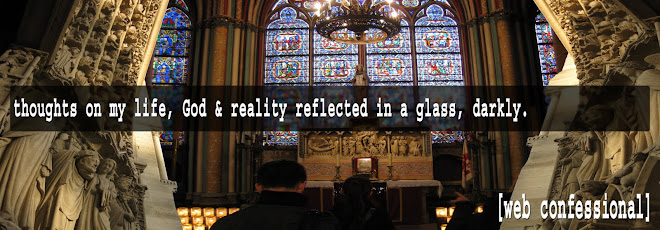i've been reading a new blog lately by a fellow grand rapidian named jeremy bouma. he has been blogging about many things emergent including doug pagitt's view of original sin. it has got me thinking about my own view, and while i would typically say that i do believe in it, something doug said in the comments really resonates with me. in fact it has caused me to do a lot of thinking today because doug's statement fits into my own worldview quite nicely.
here's a summation of my thoughts on this:
all of creation, or reality, is relational. everything that exists, including us, is made of things are that also parts of, and exist in relationship to, bigger things. humans (which are made of atoms, which form molecules, which form cells etc.) form social institutions, which make up society. the DNA or soul of society is culture.
here's a summation of my thoughts on this:
all of creation, or reality, is relational. everything that exists, including us, is made of things are that also parts of, and exist in relationship to, bigger things. humans (which are made of atoms, which form molecules, which form cells etc.) form social institutions, which make up society. the DNA or soul of society is culture.
culture is a manifestation of human relationship. human relationship engenders culture. it is the water in which we swim. culture affects us from the very beginning of our life. we are completely enveloped in it.
relationship and culture are part of who we are.
relationship and culture are part of who we are.
original sin then is the relational fracture between God and humans. this fracture spreads to human relationships and culture, which spreads to the human/creation relationship. this broken relationship with God affects our behavior and ethics since ethics are cultural and deal with relationship.
thus, because our fall comes by way of a relational fracture with God, our salvation comes by way of relational healing with God through Christ.
thus, because our fall comes by way of a relational fracture with God, our salvation comes by way of relational healing with God through Christ.
the statement i liked that doug posted was from his book, a christianity worth believing. here's the statement that resonated with me:
"Sin isn’t a legal problem with God; it’s a relationship problem with us. In the garden, Adam and Eve were perfectly integrated with God. But when they ate from the tree, they acted outside their partnership with God and began to experience the disintegration of their relationship with God. And that’s what sin is—disintegration. We were created for integration, partnering, connection with God. Sin irritates; it destabilizes. It causes us to come unraveled from the life we have with God."
i think doug is right. sin, from the beginning is a relationship problem, and not an imago dei problem. yet jeremy argues that ontologically we are still made in God's image, but ethically we are rebellious:
"We are not worms. We are the Image of God. That image is cracked and corrupted though, though, by sin which is why we act in ways that we were not intended to act, resulting in death that was never intended to be. Ethically we are morally rebellious. The ontological consequences of ethical autonomy that comes from that sin nature which Paul says we've inherited from Adam is Death (and I would also say Diseases, like cancer), but could also affect us at the DNA level."
jeremy really seems contradictory in this statement. we are the image of God, but not really...
why instead can't it be: we are the image of God, but our relationship with him is broken. that would make much more sense, and would explain why our ethics are so screwed up given that ethics are grounded in relationship and culture which affect who we are.
"Sin isn’t a legal problem with God; it’s a relationship problem with us. In the garden, Adam and Eve were perfectly integrated with God. But when they ate from the tree, they acted outside their partnership with God and began to experience the disintegration of their relationship with God. And that’s what sin is—disintegration. We were created for integration, partnering, connection with God. Sin irritates; it destabilizes. It causes us to come unraveled from the life we have with God."
i think doug is right. sin, from the beginning is a relationship problem, and not an imago dei problem. yet jeremy argues that ontologically we are still made in God's image, but ethically we are rebellious:
"We are not worms. We are the Image of God. That image is cracked and corrupted though, though, by sin which is why we act in ways that we were not intended to act, resulting in death that was never intended to be. Ethically we are morally rebellious. The ontological consequences of ethical autonomy that comes from that sin nature which Paul says we've inherited from Adam is Death (and I would also say Diseases, like cancer), but could also affect us at the DNA level."
jeremy really seems contradictory in this statement. we are the image of God, but not really...
why instead can't it be: we are the image of God, but our relationship with him is broken. that would make much more sense, and would explain why our ethics are so screwed up given that ethics are grounded in relationship and culture which affect who we are.
